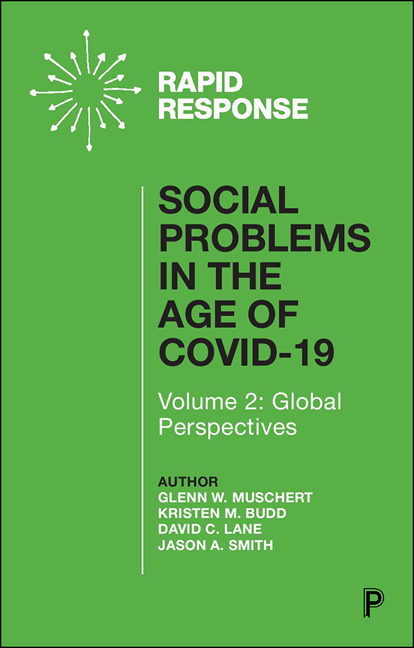Book contents
- Frontmatter
- Contents
- Acknowledgments
- Presidential Welcome
- Editorial Introduction
- 1 Isolation, Economic Desperation, and Exploitation: Human Trafficking and the COVID-19 Crisis
- 2 Uncertainty and Disruption in the Transition to Adulthood During COVID-19
- 3 Disability Rights and Healthcare Rationing during COVID-19
- 4 Social-Distancing the Settler-State: Indigenous Peoples in the Age of COVID-19
- 5 The Pandemic and the Invisible Poor of the Global South: Slum Dwellers in Mumbai, India and Dhaka, Bangladesh
- 6 The Human Right to Water and Sanitation in the Age of COVID-19
- 7 Pandemic Perils of Migrant Workers: Inequalities Intensified
- 8 Food Insecurity and COVID-19
- 9 Protecting Refugee Health and Human Rights in the Context of the COVID-19 Pandemic: Challenges and Pathways to Justice
- 10 COVID-19 Requires an Intersectional Feminist Policy Response
- End Matter
- Afterword
- Index
3 - Disability Rights and Healthcare Rationing during COVID-19
Published online by Cambridge University Press: 23 March 2021
- Frontmatter
- Contents
- Acknowledgments
- Presidential Welcome
- Editorial Introduction
- 1 Isolation, Economic Desperation, and Exploitation: Human Trafficking and the COVID-19 Crisis
- 2 Uncertainty and Disruption in the Transition to Adulthood During COVID-19
- 3 Disability Rights and Healthcare Rationing during COVID-19
- 4 Social-Distancing the Settler-State: Indigenous Peoples in the Age of COVID-19
- 5 The Pandemic and the Invisible Poor of the Global South: Slum Dwellers in Mumbai, India and Dhaka, Bangladesh
- 6 The Human Right to Water and Sanitation in the Age of COVID-19
- 7 Pandemic Perils of Migrant Workers: Inequalities Intensified
- 8 Food Insecurity and COVID-19
- 9 Protecting Refugee Health and Human Rights in the Context of the COVID-19 Pandemic: Challenges and Pathways to Justice
- 10 COVID-19 Requires an Intersectional Feminist Policy Response
- End Matter
- Afterword
- Index
Summary
The Problem
Austerity policies existed as part of neoliberal and conservative governance decades before the spread of COVID-19, though in 2019 and 2020 healthcare rationing has become a central focus for austerity across the world. Governments in countries such as the United States and United Kingdom have increased reduction on tax spending for healthcare leading to rationing within hospitals where nurses and other health professionals work fewer hours with fewer staff working at the same time, reduced resources such as personal protective equipment (PPE), medications, and ventilators. Rationing also reduces the kinds of treatments available to patients. For example, early positive statements about the use of Hydroxychloroquine, a drug for treating Lupus, in treating COVID-19, has made it difficult for Lupus patients to access the treatment. In the US, neoliberal policies rolling back the Obama-era's universal health insurance program leave many people without money for healthcare. The inability to self-fund healthcare costs has also increased the movement of disabled people from community-based living to living in private care facilities, the owners of which are financial contributors to senators and other political appointees.
Everywhere healthcare systems are implementing a triage model of care, where disabled people and others deemed too costly to treat are denied even basic healthcare to the extent of violating their civil and human rights. In the US state of Alabama, for instance, people with intellectual disabilities are barred from access to ventilators because of policies segregating people according to disability. This triage model establishes a hierarchy of disability not recognized in any disability rights legislation. The US stands out as having comparatively higher numbers of COVID-19 cases while continuing austerity policies toward healthcare resources and having strong national disability rights legislation. While the Americans with Disabilities Act of 1990, Section 504 of the Rehabilitation Act of 1973, and Section 1557 of the Patient Protection and Affordable Care Act together prohibit healthcare providers from discriminating against qualified individuals with preexisting disabilities, disability rights advocates note that state lawmakers working with limited federal aid are the ones that ultimately decide how to allocate funds
- Type
- Chapter
- Information
- Social Problems in the Age of COVID-19 Vol 2Volume 2: Global Perspectives, pp. 27 - 38Publisher: Bristol University PressPrint publication year: 2020
- 1
- Cited by



